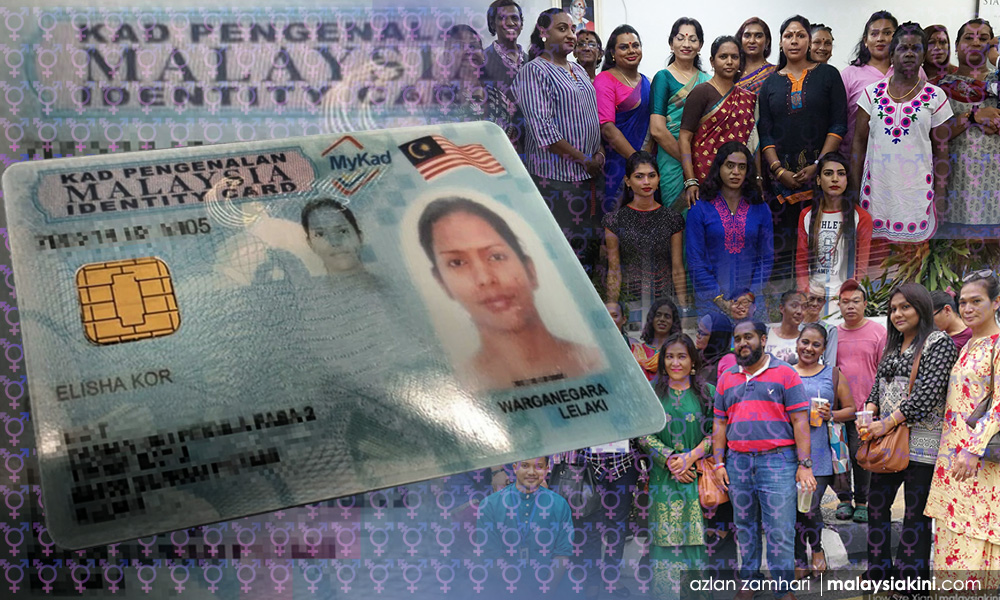
SPECIAL REPORT | The Asia Pacific Transgender Network’s Legal Gender Recognition in Malaysia 2017 report states that the transgender community face threats and exclusion from social services to their legal status.
Malaysiakini spoke to two transwomen, Elisha Kor Krishnan and Vasugi Amma, to gain insight into the difficulties faced by the community in changing their gender markers in their identification cards (ICs).
As Elisha and Vasugi note, the government did not explicitly prohibit gender changes in the ICs before the 1980s. There was even a doctor in a Kuala Lumpur public hospital who transgender people would call to perform sex reassignment surgery (SRS).
But things have taken a turn for the worse since.
The resistance to legal recognition of gender is largely informed by religion. This is apparent with the issuance of a fatwa deeming SRS haram in 1982 – save for intersex people who undergo the surgery to keep one sexual organ.
According to Vasugi, the fatwa was a turning point for the transgender community. Since then, many Muslim surgeons refuse to perform SRS, leading transgender people to seek the procedure abroad.
“Many trans people went to Thailand, Singapore and Indonesia for the SRS,” she told Malaysiakini.
This was compounded by a 2005 fatwa stating that gender markers could only be changed if the surgery was performed in accordance with Islamic law.
Against the wall
Elisha’s own application to have her gender changed on her IC was turned down by the National Registration Department. Many who have approached Pertubuhan Kebajikan dan Kesihatan Umum Malaysia (PKKUM) – the NGO she founded – have met with the same resistance.
The NRD does not reject outright applications for IC gender changes, but it has put in place largely prohibitive prerequisites to fulfil with the enforcement of National Registration Department Order No 9/2007.
Since then, those wishing to change their gender markers in their ICs require a court order, along with several other supporting documents – including a certificate from the surgeon who performed the SRS, and physical and psychological assessments from a government doctor.
Lawyers have deemed these requirements illogical. As Diversity legal adviser Jackson Yee told Malaysiakini, “It is impossible for trans people to get all the documents listed by the NRD, especially the court order.”
Pointing out that public hospitals have largely stopped providing approvals since the 1982 fatwa, Yee added: “Without all the documents, how are you going to apply for the court order? And it is really difficult to collect all the documents.”
Landmark judgment
Seven court cases on transgender people fighting to switch genders on their ICs have been reported in the media over the years. Six were thrown out of court.
The one success, Yee stated, was in the case of JG v NRD, wherein the court cited the common law case of Corbett vs Corbett.
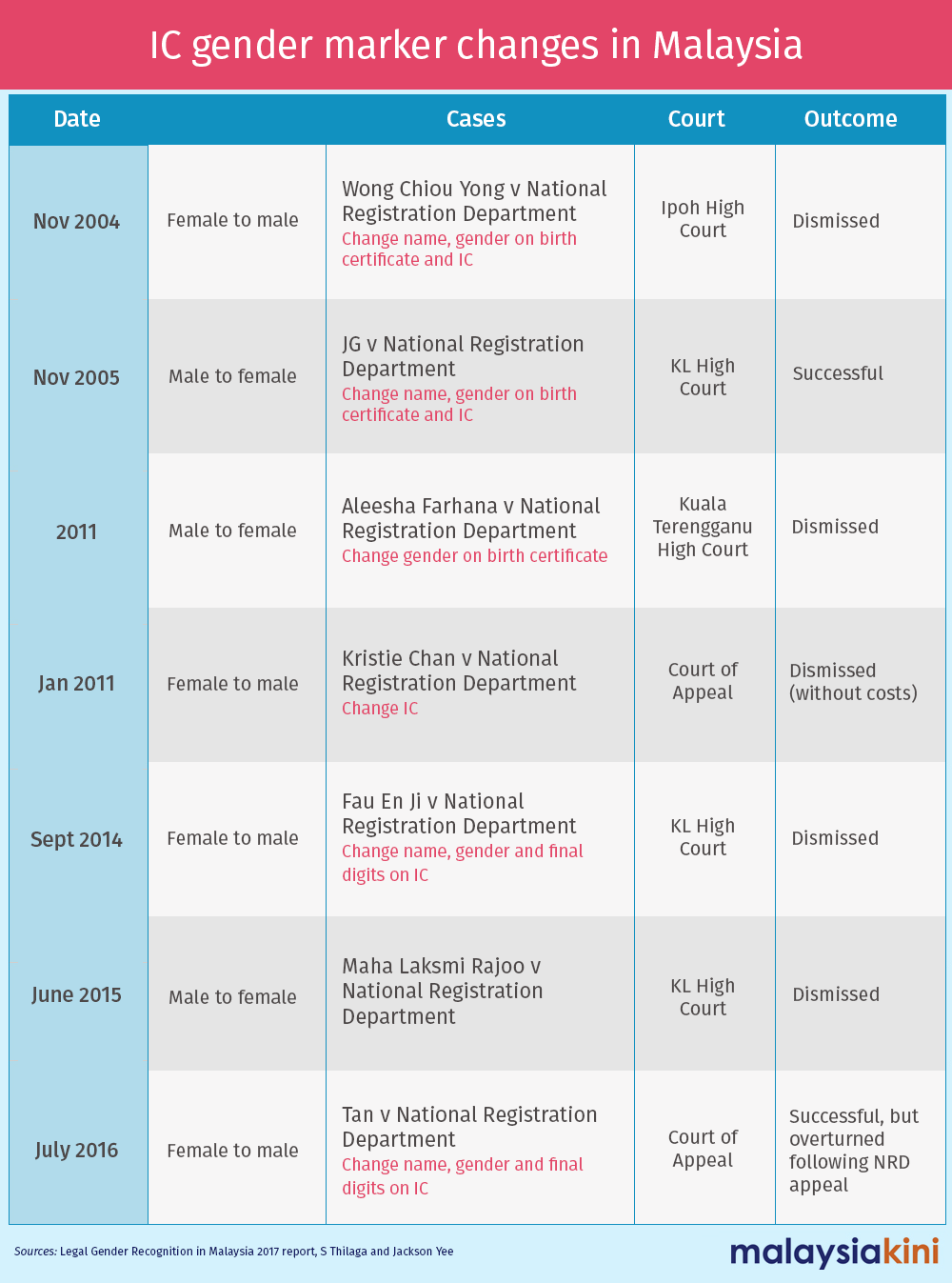
The 1971 decision was reached at a time when mutual consent was not considered grounds enough for a divorce in the United Kingdom. The plaintiff, Arthur Corbett, sought a method of dissolving his marriage to model April Ashley, and argued that she was a man despite her gender change.
The judge in the case then set four criteria for determining “sex”: chromosomal factors, gonadal factors (i.e., presence or absence of testes or ovaries), genital factors (including internal sex organs), and psychological factors. Transsexualism was deemed to fall under the last criterion.
As Yee explained, the case is now moot in the UK with the introduction of the Gender Recognition Act 2004.
Under the Act, “a transgender person does not need to show all the test results as required in order to change their gender status,” he said.
“But we still deem Corbett vs Corbett as a landmark case.”
Even so, Yee noted that the criteria outlined by the judge in the 1971 case do not apply, as gender identity is affected by social, physical and psychological factors.
“For example, we can never change our chromosome. How are you going to change it? Not even through surgery. It’s impossible to change.”
'Correction', not change
In an Oct 19 email, the NRD told Malaysiakini that according to Section 27(3) of the Births and Death Registration Act 1957, only the “correction (memperbetulkan)” of gender, but not “change (meminda)” is allowed.
“The NRD will ensure the application is to correct facts, not to change the information of applicants,” it said.
Section 27(3) states: “Any error of fact or substance in any register may be corrected by entry (without any alteration of the original entry) by the Registrar-General upon payment of the prescribed fee and upon production by the person requiring such error to be corrected of a statutory declaration setting forth the nature of the error and the true facts of the case, and made by two persons required by this Act to give information concerning the birth, still-birth or death with reference to which the error has been made, or in default of such persons then by two credible persons having knowledge to the satisfaction of the Registrar-General of the truth of the case…”
Accordingly, the NRD stressed that the gender stated on one’s IC is based on what is listed on one’s birth certificate.
With certain applicants also requesting a change in the last two digits of their IC numbers, the department also clarified that these have nothing to do with one’s gender, as is commonly believed.
“The IC number does not represent the gender of a person. The first six digits are the birth date, and the following two digits represent the location of birth, and the last four digits are randomly selected by the computer,” it said.
At great cost
Kasturi (photo), PKKUM’s adviser on legal affairs, said many transgender people choose not to take the NRD to court after their applications are turned down due to the steep costs involved.
“The price depends on the lawyer, if let’s say, it is only a High Court matter. Lawyers who work for NGOs can easily charge RM10,000. Other lawyers can charge RM50,000 to RM60,000. It is very expensive.
“And how much can a lawyer do? It takes time, energy… RM10,000 is already the mercy price.
“And this doesn’t guarantee a win. If you lose, you have to appeal, that will need a separate fee. That’s why many people don’t take their cases to court if their applications don’t go through,” she said.
Kasturi believes that there must be more cases of the NRD being taken to court than the seven reported by the press. “I don’t think there are only seven,” she said. “I think most of them choose to remain silent.”
She also called into question figures from the Home Ministry, which state that a total of 16 transgender people applied for their gender markers to be changed from 2015 to September 2017. She herself has 20 cases on hand at present.
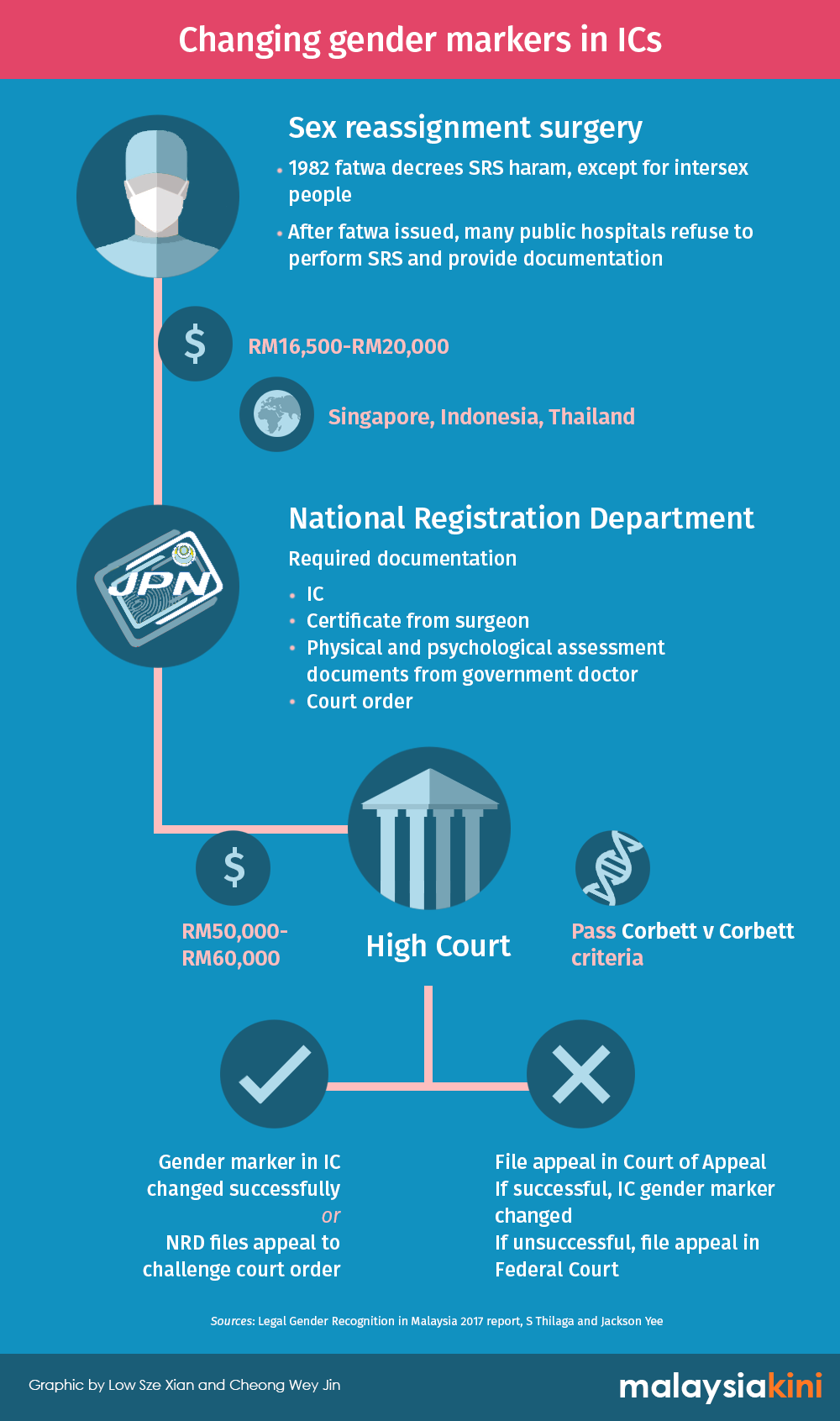
Malaysiakini’s attempts to obtain more information from the NRD, the Statistics Department and the Women, Family and Community Development Ministry proved unsuccessful.
“There are no statistics for trans people in this country, and that’s a problem because we don’t have a lot of information regarding their health issues, poverty level, unemployment rate, university dropout rates, the rate of crime and violence against them.
“For now, the data collection of public and the private sectors remain binary and limited to two categories for gender, and requires people to provide information as per legal documents,” said S Thilaga, an activist with Justice for Sisters.
Equal before the law?
Kasturi also believes that the rights of transgender people should not be limited by narrow definitions of existing laws.
“If you want to talk about rules and laws, I will tell you that the National Registration Regulations 1990 states that the bearer of the IC who discovers that it contains particulars which, to his or her knowledge are incorrect, shall apply to amend the incorrect particulars,” she said.
“And, the Federal Constitution states that all people are equal before the law and entitled to equal protection.
“Trans people can’t even get insurance, get enrolled in colleges… And this is what we deem as fair and equal?”
Yee concurs. “If we were able to change our IC gender status before the 1980s, why can’t we change it now?”
At present, Kasturi is working with Elisha to fill the statistical gap and collect information from transgender people who want their gender markers on their ICs changed.
She says that the information has been relayed to the Women, Family and Community Development Ministry.
“I have no idea (whether things will be different) with the new government, but we are giving it another try.
“We tried before during the BN era, but it didn’t work out. NRD dismissed the applications without giving any reasons.
“I know they (transgender people) are a minority, but it does not mean they are not important, right? This is about basic human rights, basic medical rights, and basic education rights. This is just about human rights.”
Elisha, meanwhile, recollected the situation of a transgender friend who now lives in London.
“I have a transgender friend. She was a Malaysian and she now stays in London… she got a PR and now works as a prosecutor. She can totally live like a woman.
“I feel proud of her, and if we have the same rights as she does in London, we can be like her as well, right?” - Mkini



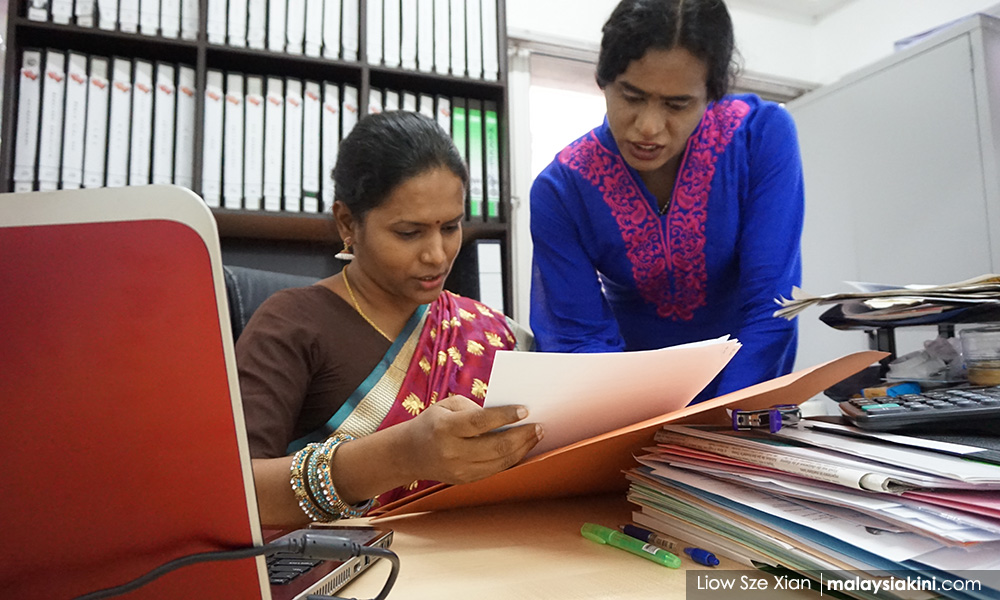
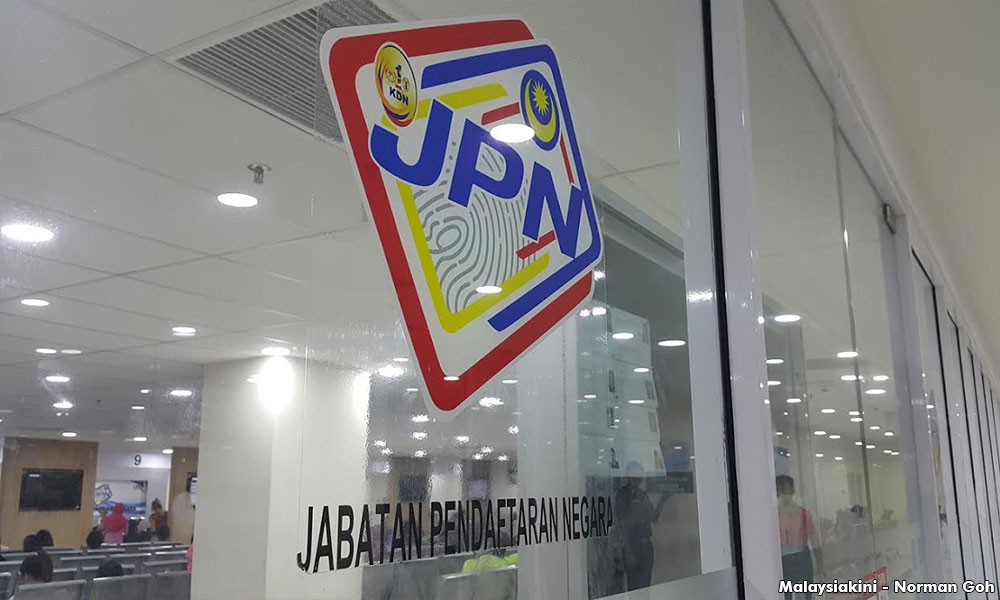
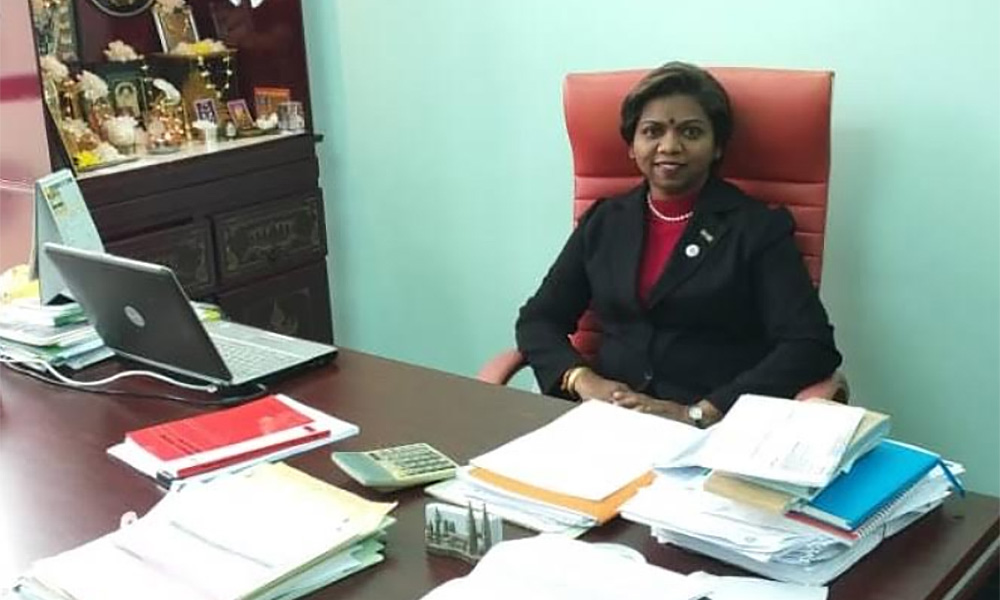
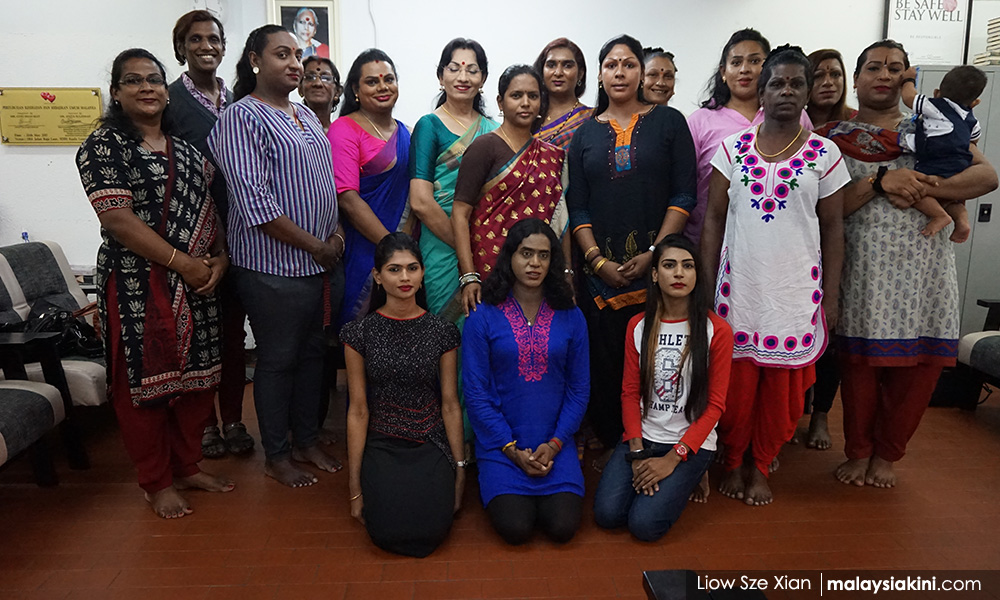
No comments:
Post a Comment
Note: Only a member of this blog may post a comment.